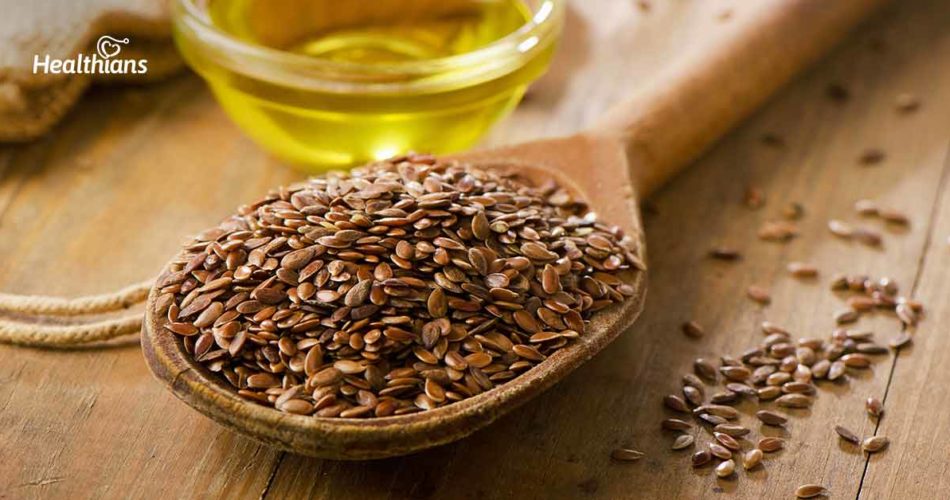Contributed by: Healthians Team
Introduction
Flaxseeds are plant-based foods that provide healthy fat, antioxidants, and fibre. They are one of the earliest crops that have been farmed throughout history.
Though tiny in size, these brown seeds have been prized for their health-protective properties for many years.
Now, centuries later, they have risen to prominence by resurfacing as a ‘super food‘ and are being recognised for their multiple health advantages.
Due to their high nutritional value, some people also call it one of the most powerful plant foods on the planet to boost health.
Observational studies show that flaxseeds provide a wealth of nutrients, including Omega-3 fatty acids, lignans, protein, and fibre in just one teaspoon.
They are one of the most abundant plant sources of fatty acids, as well as vitamins and minerals.
Scientific research points that flaxseeds are packed with numerous health advantages. In this blog, we will throw light on some impressive health benefits that are attributed to consuming flaxseeds.
Flaxseed: The new wonder food
Although flaxseeds contain some traces of vitamins and minerals (but not significant quantities), their major health benefits are mainly attributed to three beneficial components:
An abundant source of Omega-3 fatty acids
Flaxseed may help to decrease blood pressure, according to new studies. These effects could be attributed to flaxseed’s Omega-3 fatty acids as well as its amino acid groups.
Omega-3 fatty acids are necessary lipids that the human body cannot make by itself.
As a result, it’s critical to include Omega-3 fatty acid-rich foods in your diet. Omega-3 fats are largely present in fish, some vegetable oils, nuts, green leafy vegetables, and seeds, in addition to flaxseeds.
- The Omega-3 acids in flaxseeds are beneficial for the heart and help lower the risk of heart disease
- They are also good for eye health and help avoid disorders like macular degeneration
- They also help support brain growth and healthy brain functioning
High in fibre
Flaxseeds have low carbohydrate content but high fibre content of both soluble and insoluble fibre.
As a result, they are truly a powerhouse, as these types of fibre keep your gut microbiome in a healthy balance and aid colon detoxification.
This is particularly good for persons who have constipation.
Rich source of lignans
Flaxseeds include a group of nutrients called lignans. Lignans are antioxidants that have powerful antioxidant and estrogen properties. These substances protect the body’s cells from injury.
As a result, flaxseeds can help prevent heart disease and other diseases like cancer by fighting oxidation caused by free radical damage.
According to various research, lignans may help reduce the risk of cancer and raise the survival rate of breast cancer patients.
- Flaxseed lignans help to balance out the androgen hormones that cause acne.
- Flaxseeds’ lignans and antioxidants fight free radical damage while also promoting hormonal balance and cellular regeneration, which helps to slow down the ageing process.
Additional health benefits of flaxseeds
So what is it about flaxseeds that make it worthy of starring in so many health foods? Let’s take a quick look at some of its foremost benefits.
- They have anti-inflammatory characteristics that help the body to heal from inflammation
- They enhance bone and joint health
- The mucilage gum, found in flaxseeds, is a water-soluble, gel-like producing fibre that passes slowly through your stomach without being digested. This gel maintains food in your stomach for a long time, making you feel full and satisfied. Flaxseeds are therefore advantageous for persons who are seeking to lose weight
- Known to help with menstrual cramps and other menopause symptoms like hot flashes in older women
- Good for balancing oestrogen levels in the body, which can help menstrual women to maintain a regular cycle
- Appear to have the potential to lower the risk of breast cancer, particularly in postmenopausal women
- Assist to reduce the chance of getting osteoporosis
- Can be applied to promote healthy hair, skin, and nails
Incorporating flaxseeds into your diet
Flaxseeds have a nutty flavour comparable to that of sesame seeds.
As a versatile food ingredient, flax seeds or flaxseed oil are easily adaptable to your diet and may be used in a wide range of meals and dishes.
It should be mentioned that grounded flaxseeds are better absorbed by the body.
Whole flaxseeds move through your digestive tract without absorbing any nutrients. To fully reap the health benefits of flax seeds, it is recommended to consume grounded flaxseeds.
Flaxseeds can be roasted and grounded before being stored in an airtight jar in the refrigerator. Whole flaxseeds can be kept for up to a year in an airtight jar at room temperature.
Final thoughts
Given the overall advantageous effects of flaxseeds for the body, there’s no better time than now to grab some flaxseeds from your local grocery store.
With so many nutrients packed in each tiny seed, flaxseeds can be a beneficial and nutritious addition to your diet.
However, it’s tempting to think of flaxseed as a miraculous magic bullet to live a healthy life.
But keep in mind that one must maintain a good diet as well as a healthy lifestyle that includes appropriate sleep, water, and exercise.
Also, to make sure that a health complication never goes overlooked, get preventive health checkups regularly.
These health checks not only give a comprehensive insight into your health but also allow you to take the necessary steps to promote your overall well-being.




